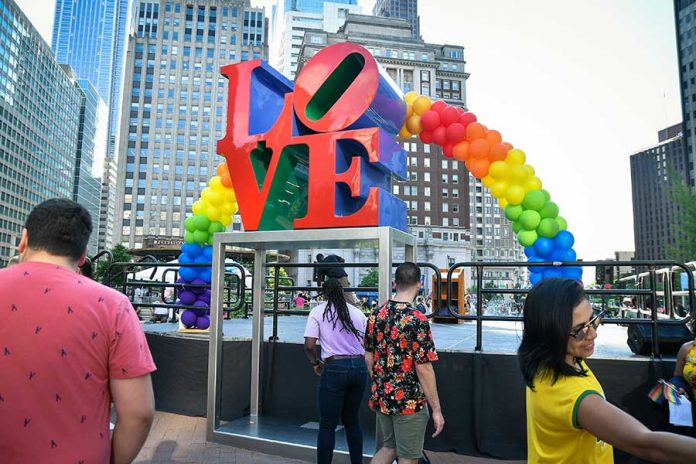The 2019-20 Philadelphia Resident Survey details responses to city services such as public safety, healthcare, community programs and education, among other services that impact quality of life. It also breaks down Philadelphia demographics, including race, gender identity, sexual orientation, age, education level and other identifying factors.
Weighted results indicate that 1,431 respondents identify as something other than straight, or 12.6 percent, and 9,032 respondents identify as straight, or 79.4 percent.
Mike Dunn, senior deputy communications director for the city of Philadelphia said, “the results show a strong desire from our LGBTQ+ residents to be counted and have their voices heard by local government.”
An unpublished section of survey results provided by Nathaniel Olin, social scientist for the Mayor’s Office, includes LGBTQ+ responses to public safety, police performance, health services, safety while traveling, community services and general affordability. These weighted responses also indicate that 103 Philadelphian respondents identify as transgender at 0.9 percent, 216 people preferred not to disclose their gender identity at 1.9 percent and 107 people identify as nonbinary or a third gender at 0.9 percent.
While the published survey included overall responses based on race and education level, it excluded breakdowns of LGBTQ responses to city services, but this information was collected. Based on unpublished results, LGBTQ respondents are generally less satisfied with Philadelphia police performance and with healthcare services than their straight, cisgender peers.
Of those people who identify as non-cisgender, nonbinary and/or non-straight, 26.9 percent find the police’s overall role in public safety to be poor. Only 16.2 percent of those who identify as a straight cisgender man or woman find police performance to be poor. Of those who identify as non-cisgender, nonbinary and/or non-straight, 25.3 percent consider police conduct to be poor, whereas 14.7 percent of heterosexual, cisgender people find police conduct to be poor.
According to the most recent U.S. Transgender survey, over 58 percent of respondents were assaulted, harassed and/or misgendered by police officers who knew or believed them to be transgender. Over 57 percent of respondents said they are not comfortable approaching the police for help if need be. In 2015, 33 percent of Black transgender women and 30 percent of multiracial women said that police officers with whom they interacted thought they were sex workers. The National Coalition of Anti-Violence Programs showed that trans and nonbinary people experienced hate-violence-fueled homicides at a 42 percent increase from 2016 to 2017. The majority of the victims were people of color.
“I think if we look at the nation as a whole, we still see it all the time,” said Deja Lynn Alvarez, trans activist and member of the LGBT Police Liaison Committee. “We have community members that say they are in an abusive relationship, they’re afraid to call 9-1-1 because they’re afraid the police aren’t going to see their relationship as equal to. That’s something that’s being worked on and that we talk about regularly and we’re trying to figure out ways to address it.”
In collaboration with the Office of LGBT Affairs and members of the local LGBTQ community, the Philadelphia Police Department issued Directive 4.15 in 2019, which instituted a new policy dictating how police are required to treat transgender and gender-nonconforming people. The policy states that police officers are required to make sure their paperwork reflects a person’s chosen name in addition to their legal name, bring trans people in custody to the closest hospital or clinic to have their medical needs met, including hormone therapy, and other codes of conduct to ensure trans and nonbinary people are treated fairly.
“You can change policy, you can change laws, but that doesn’t change people’s personal biases and their personal beliefs,” Alvarez said. “My activism started out of years and years of police abuse and aggression. So I get it. It’s going to take another 20 years before we get to a place where things are easier. Right now, it’s that uncomfortable, scary time for a lot of folks.”
Despite LGBT-centered healthcare providers like Mazzoni Center and Philadelphia FIGHT and LGBTQ-focused healthcare in places like Temple University Hospital, 20.4 percent of Philadelphians who identify as non-cisgender, nonbinary and/or non-straight believe that Philadelphia’s health services are fair, while 16.8 percent of the same population find them to be poor; 23.8 percent believe that the city’s behavioral health services are poor.
Though the HRC’s 2019 Health Equality Index ranked Philadelphia as one of the top providers of LGBTQ healthcare in the U.S., the lack of statistics on trans-competent healthcare makes it difficult to determine if Philadelphia, or any city, is able to provide proper medical care for trans residents. A 2017 study by the U.S. National Library of Medicine indicated that the largest obstacle to trans healthcare, according to transgender people, is insufficient access to a dearth of medical professionals who are adequately knowledgeable in the area.

